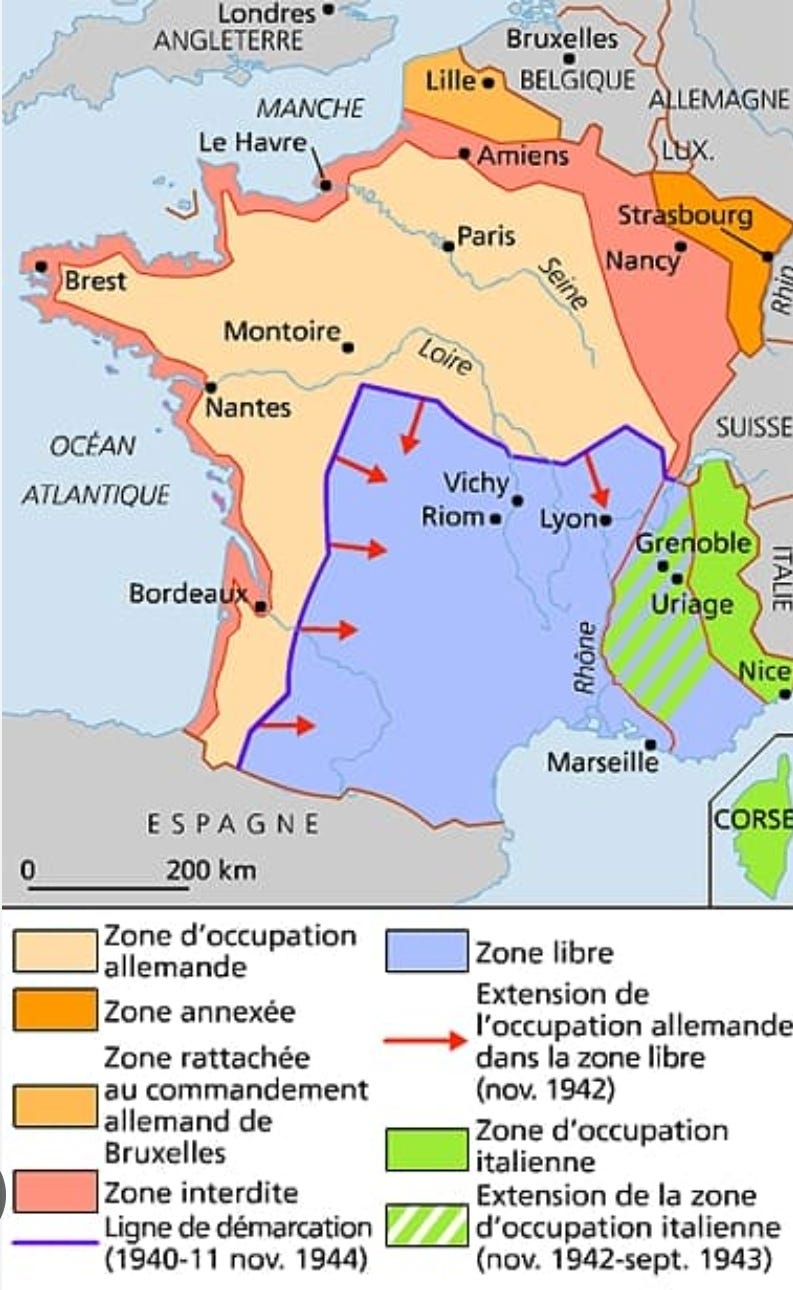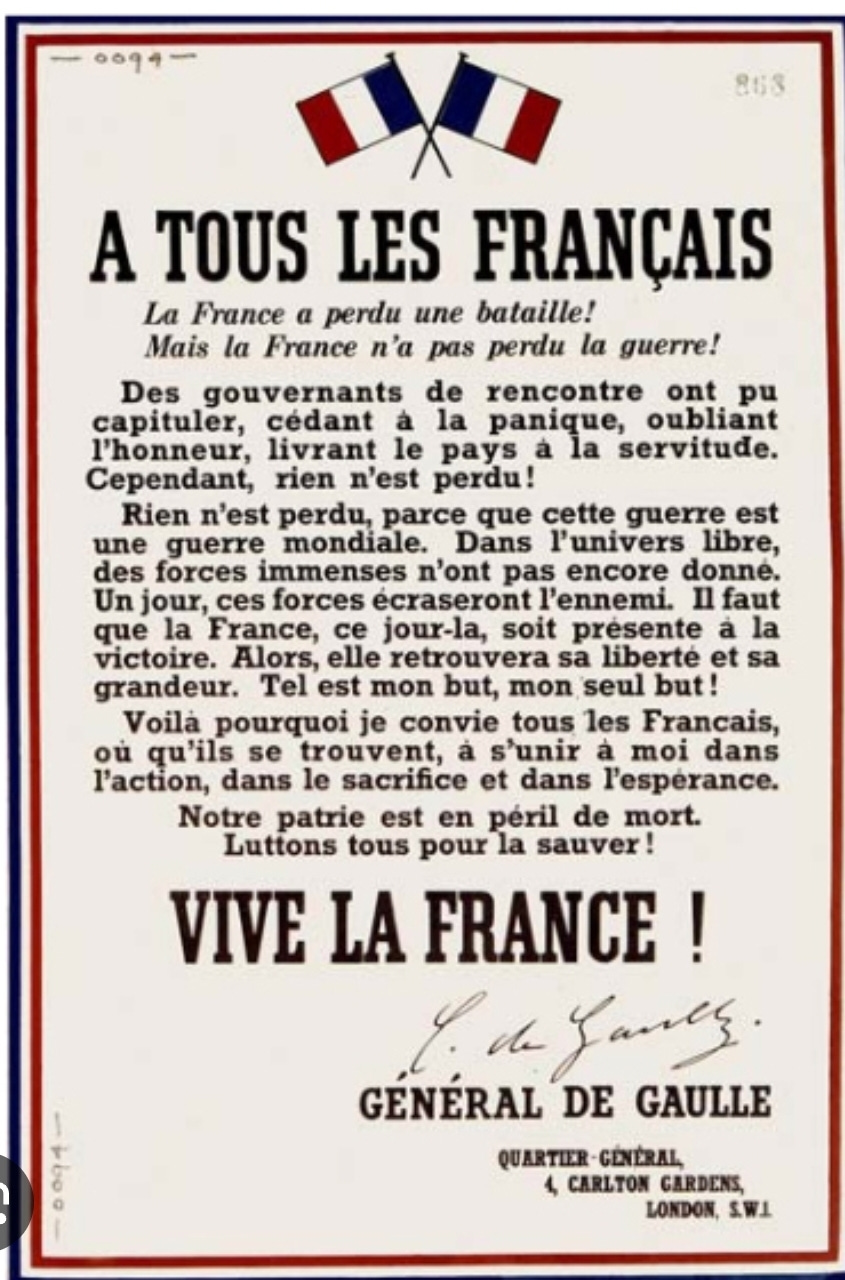My grandfather's letter / La lettre de mon grand-père
Communicating in spite of government censorship / Communiquer malgré la censure

(Version française après le texte anglais/ French version of this post is at the end of the English text)
I don't know when or how Albert, my maternal grandfather, joined the Resistance during World War 2. From my mother's stories, I get the impression that my grandfather was a bit of an adventurer. His career as a butcher seemed short-lived, and I have a record of him declaring bankruptcy in 1930 as a “forain” (street merchant) before my mother was born. He must have continued doing that in some shape or form, because Mom remembered briefly helping him sell bundles of bedsheets and towels in street markets in the city. She also mentioned a possible gambling habit, with memories of “boom and bust” episodes of living very well followed by more meager times. Mom confirmed that her dad was with them during the evacuation in 1939 to Hablainville, the village that was a two-hour drive from the city of Nancy where they lived before the war, in the northeastern region of France.
How and why did he end up being part of a Resistance network in the port of Marseille on the Mediterranean Coast, where he was arrested by the Gestapo in 1943? Did he decide to join the Resistance after hearing General De Gaulle's famous “call to action” speech on June 18th, 1940 on the radio (called “l’appel du 18 juin” in French)? Did he flee to the Southern France free zone (“zone libre”) first, to escape persecution as Jew after the French surrendered to Hitler's army? I may never know for certain, but I have some leads to explore that might help.

*Share/subscribe break* If you're enjoying the stories of my mom's childhood WW2 experiences in France and you know someone who'd enjoy them as well, please share! And if you'd like to support my writing, subscribe to see more posts. $€¥£ contributions are always welcome of course, but my posts will remain free for now 🙂🇫🇷.
Mom had mentioned that her dad's arrest may have been subsequent to the dismantling of major Resistance factions in southern France after the arrest of their leader, Jean Moulin, mid-1943. I discovered that the report of my grandfather's arrest is archived by the French Defense Ministry & I can ask to see it. I'll share that with you in a later post if I find anything of substance.
From his prison in Marseille, Albert was allowed to send letters and receive care packages. He wrote to his wife Jeanne requesting that she send him his toiletry kit that was in the middle shelf of the armoire in their bedroom, tucked behind his socks. When Jeanne went to get his kit to prepare a care package to send to him, she found instead a small stash of rolled-up French Franc bills hidden away in the armoire. She had no idea that they were there. The extra money helped support the family during the difficult times ahead. It may have also helped Jeanne make the arduous trek to Marseille to try and obtain Albert’s release.
As you can see from the map of 1940 France, travel from Nancy to Marseille required passage through multiple military checkpoints and public transportation conditions were dire. Jeanne was only able to undertake such a journey across zones because she wasn't Jewish. It took Jeanne several days to finally reach Marseille and the prison where Albert was held. While inquiring about his release outside of the prison, Albert recognized Jeanne's voice and called her name from where he was. Jeanne could hear Albert, but she couldn't see him.
Years later, my mom said that my grandmother would hear Albert's voice calling her in her dreams…
🇫🇷 Je ne sais pas ce qui a poussé mon grand-père Albert a rejoindre la résistance. Les récits de ma mère à son propos dépeignent un certain esprit aventurier. Il semble avoir été brièvement boucher dans les années 20 et j'ai retrouvé une déclaration de faillite de son entreprise en tant que “marchand ambulant” daté de 1930. Ma mère se souvenait de l'avoir aidé à vendre du “blanc” (linge de maison) sur les marchés; il a donc poursuivi ce métier après sa naissance en 1932. Elle se souvenait aussi d'un certain appétit pour les jeux du hasard et les paris, avec des alternances de période fastes suivies de moments plus frugaux. Son père était bien présent au moment de leur évacuation en 1939 vers Hablainville, petit village proche de Baccarat, situé à une centaine de kilomètres de Nancy.
Pourquoi a-t-il rejoint la Résistance ? Et comment s'est-il retrouvé à Marseille, à plus de 700 km au sud, au moment de son arrestation par la Gestapo en 1943 ? A-t-il été inspiré par l'appel du 18 juin 1940 du général de Gaulle ? S'est il d'abord enfui vers la “zone libre” pour échapper à la persécution anti-juive ? J'ai quelques pistes à creuser, même si je ne réussirai sans doute jamais à déterminer avec certitude les étapes qui l'ont mené à rejoindre ce réseau secret. Maman s'était demandé si son arrestation avait eu lieu au moment du démantèlement de réseaux de résistants du Sud après l'arrestation de Jean Moulin mi-1943. J'ai découvert que le rapport de l'arrestation de mon grand-père est archivé au ministère de la Défense à Caen et j'ai fait la demande de le consulter. Je partagerai ce que j'y trouverai si cela en vaut la peine.
Une fois emprisonné à Marseille, Albert a pu communiquer par courrier avec ma grand-mère et réceptionner des colis. Il a demandé qu'elle lui envoie sa trousse de toilette qui se trouvait au fond de l'étagère du milieu de l'armoire de leur chambre, derrière ses chaussettes. Quand Jeanne a ouvert l'armoire pour préparer son colis, au lieu de la trousse de toilette, elle y a découvert des rouleaux de billets de banque, un petit “bas de laine” salvateur dont l'existence lui était inconnue jusque-là. Cet argent l'aida à soutenir la famille et à effectuer un voyage à Marseille pour tenter de faire libérer son mari. Jeanne mit plusieurs jours à atteindre la prison marseillaise, les transports publics étant sévèrement perturbés par les dommages de la guerre et ralentis par les vérifications fréquentes des papiers des voyageurs lors des passages de zones militarisées à la zone dite “libre”. Elle ne fut pas inquiétée par tous ces contrôles, n'étant ni juive ni officiellement mariée à Albert.
Arrivée à la prison, pendant que Jeanne sollicitait les geôliers pour faire libérer Albert, il a reconnu sa voix sans pouvoir la voir. Il l'appela « Jeanne ! Jeanne ! » elle l'entendait mais ne pouvait le voir. La tentative de libération échoua et elle n’a jamais revu son mari. Transféré à Drancy quelques semaines plus tard, Albert Cerf Bloch fut embarqué le 7 décembre 1943 sur le convoi numéro 64 de Drancy, destination Auschwitz-Birkenau, où il a été assassiné par les nazis.
Des années plus tard, Jeanne confia à ma mère qu'elle entendait parfois Albert l'appeler dans ses rêves.





Great job, sister! I also remember hearing that our mother helped our grand-dad fold up little paper tricks or toys; then he took them to market with him to sell the things, saying "Look! So simple a child can do it!" So many tales... Thanks for writing it ! Bises & love
Hi LORRAINE , Great writing and He was a hero . I know a person , Who's dad worked for french underground well most of their family did after they escaped from a nazi camp ,they were Jewish so knew the would die in the camp . So they took a chance out of 6 of them 5 made it out other one killed trying to escape . As you post more about this i will gladly Talk to my friend , and see if he can help you with info . Hugs and peace and grandad was a hero